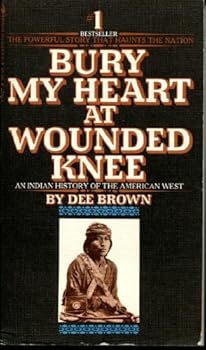
I know I am coming to this book late, but felt it necessary to read this (and others) from the native standpoint since I am also reading many books that seem to be about colonization.
I, myself have perhaps been somewhat selfishly in sorrow for how our little seaside community is now turning into “Disneyland”, and I realize now how much the Indigenous people went through as they gave up everything they know and are coerced into living white. In many cases they paid with their lives.
Every step of the way, Tribes were forced to comply with the Army’s demands.
The Army and associated people broke promises and treaties, with every tribe.
Admittedly, this is a heartbreaking book that leads me to cheer for the underdogs. I even reveled in the one-time defeat of the Army and Custer:
“For a long time Crazy Horse had been waiting for a chance to test himself in battle with the Bluecoats.”
“Crazy Horse kept his warriors mounted and always moving from one place to another.”
“There was only one who was considered as being above the others. This was Sitting Bull.”
“Crow King said that all the soldiers dismounted when the Indians surrounded them. “They tried to hold onto their horses, but as we pressed closer they let go of their horses. We crowded them toward our main camp and killed them all. They kept in order and fought like brave warriors as long as they had a man left.”
The above text is about the only large battle that the Indians clearly won, as opposed to small raids on isolated villages.
Most of this book is about screwing the natives over and betraying them.
For context of the events, it was really helpful to read “Continental Reckoning” by Elliot West.
(My review here: https://covertbookreport.com/review-continental-reckoning-by-elliot-west/ )
West correctly, for better and in many cases worse, identifies the economic machine at work.
The discoveries of gold and silver, as well as the later drives to instant communication (the telegraph), and near-instant transportation via railroads, as well as “The Grass Revolution”, including replacing native grasses and buffalo with cattle.
Absolutely nothing would stop this Juggernaut. This was the plan to settle the West after the
Civil War.
I simply had to read this sad book. After all the reading on colonization, I needed to read this one, and recommend it, for a nearly-full concept on what occurred.
-John Titus
https://covertbookreport.com/


I’ve read this book, and it is essential when trying to learn more about colonisation. It was deeply moving as well as a stark look at how Indigenous communities were treated. Very important.